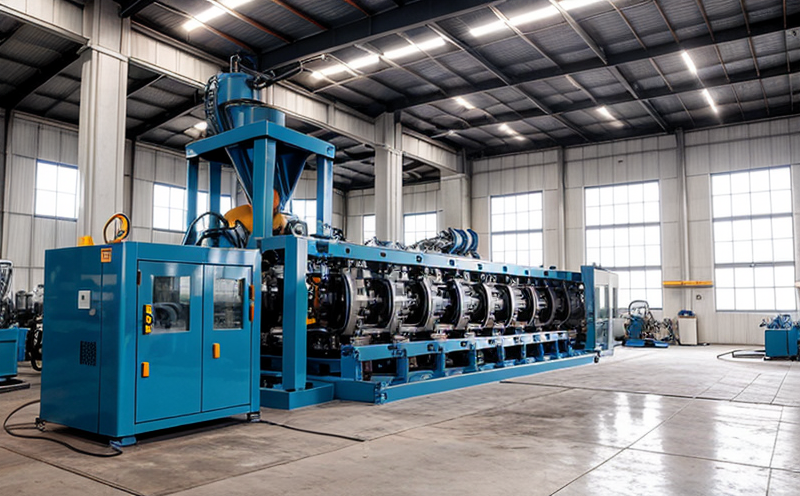ASTM D695 Compressive Performance Testing of Machine Plastics
The ASTM D695 standard test method is widely recognized as a critical tool for evaluating the compressive properties of plastics, especially in industrial manufacturing and processing environments. This service focuses on assessing the mechanical integrity and performance of machine plastics under compression forces, which are common stressors in industrial applications.
Machine plastics are often exposed to high-stress conditions during operation, making their compressive strength a crucial factor in determining product reliability and longevity. By conducting ASTM D695 testing, manufacturers can ensure that the materials used meet industry standards and customer expectations. This service is particularly beneficial for industries such as automotive, aerospace, and construction, where parts are subjected to significant mechanical stress.
The test involves subjecting a rectangular specimen cut from the plastic material to uniaxial compression until failure occurs. The force required to cause this failure is recorded, providing valuable insights into the compressive strength of the material. This information helps manufacturers identify optimal materials for their applications and improve product design.
During specimen preparation, it's important to ensure that the test specimens are representative of the actual parts they will serve in machines. Factors such as orientation, thickness, and uniformity can significantly influence the results of the ASTM D695 test. Proper sample preparation ensures accurate and reliable testing outcomes.
The use of advanced testing equipment is essential for obtaining precise measurements during the compressive performance test. Our laboratory employs state-of-the-art machines that provide consistent and repeatable results, adhering strictly to ASTM D695 specifications. These machines are regularly calibrated to maintain accuracy over time.
After the test, comprehensive reports are generated detailing the force applied before failure, displacement at maximum load, yield strength, ultimate strength, and other key metrics. This data is invaluable for quality assurance teams and R&D engineers in optimizing material choices and process improvements.
In addition to ASTM D695 testing, we also offer a range of complementary services that can help enhance the overall performance and reliability of machine plastics. These include stress-strain analysis, modulus determination, and residual strain evaluation. By integrating these tests into your quality control processes, you can achieve a more thorough understanding of how different factors affect material behavior under compression.
- Representative specimen preparation for accurate testing
- Use of calibrated, high-precision testing equipment
- Comprehensive reporting of test results with key metrics
- Inclusion of stress-strain analysis and modulus determination
Quality and Reliability Assurance
The ASTM D695 compressive performance testing service plays a pivotal role in ensuring the quality and reliability of machine plastics. By rigorously adhering to industry standards, this test method helps manufacturers identify potential weaknesses in their materials early on, allowing for timely corrections before product launch.
One of the key benefits of ASTM D695 is its ability to detect flaws or inconsistencies within the material that could lead to premature failure. This proactive approach contributes significantly to enhancing the overall reliability and durability of industrial machinery components. Through regular testing, manufacturers can maintain consistent quality across all production batches.
The results from these tests are used extensively in the development phase of new products. Engineers use this data to refine designs, select appropriate materials, and optimize manufacturing processes. This ensures that any product leaving the factory meets or exceeds customer requirements and regulatory standards.
Moreover, ASTM D695 testing supports continuous improvement efforts by providing a benchmark against which future iterations can be measured. As technology advances, so too do material properties; thus, periodic retesting helps keep pace with technological changes while maintaining high-quality standards.
Customer Impact and Satisfaction
Implementing ASTM D695 compressive performance testing into your quality assurance protocols has numerous benefits that directly impact customer satisfaction. First and foremost, it enhances the trustworthiness of your products by demonstrating adherence to recognized international standards like ISO 14001 for environmental management systems.
Customers appreciate knowing that their suppliers are committed to producing reliable components that will perform consistently over time. This not only builds long-term relationships but also fosters loyalty among repeat customers who rely on consistent quality.
By incorporating ASTM D695 testing into your supply chain, you can reduce warranty claims and returns due to material failures. Proactive identification of potential issues through comprehensive testing ensures that defective parts are caught early in the production cycle rather than reaching end-users.
Sustaining high levels of customer satisfaction is crucial for maintaining profitability and growth within competitive markets. Positive feedback from satisfied customers translates into improved market positioning, increased brand recognition, and enhanced reputation—all essential factors for sustained business success.
International Acceptance and Recognition
The ASTM D695 standard test method is internationally recognized and widely accepted across various sectors including automotive manufacturing, aerospace engineering, construction equipment production, and more. Its global acceptance stems from its rigorous methodology which consistently produces reliable results.
Countries around the world often adopt ASTM standards as part of their national regulations or voluntary guidelines because they provide a common framework for evaluating material properties. This harmonization facilitates international trade by ensuring compatibility between suppliers and buyers regardless of geographical location.
Adopting ASTM D695 in your manufacturing processes can open up new markets where these standards are required or recommended. It demonstrates compliance with global best practices, potentially leading to increased exports and opportunities for collaboration with international partners.





